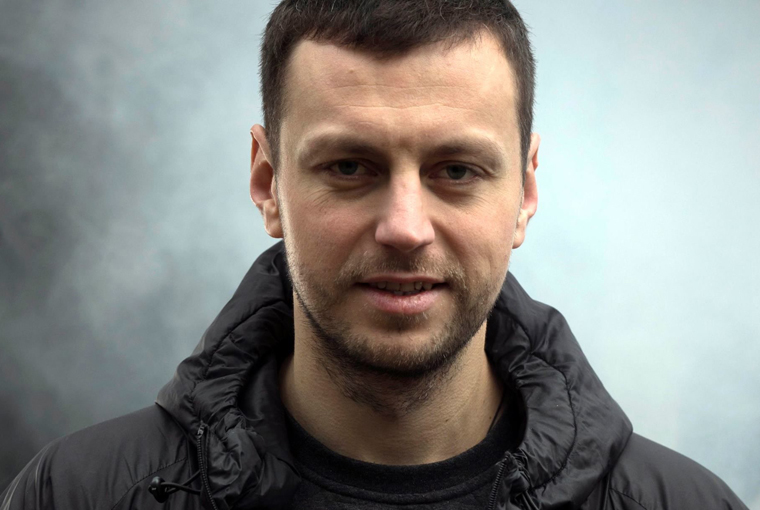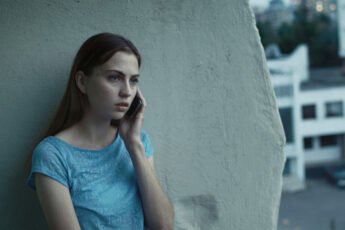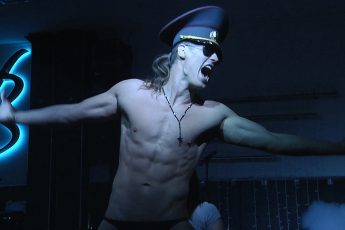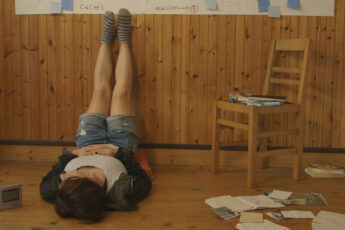
We met documentary filmmaker Andrei Kutsila at goEast 2019, where he presented his latest film “Strip and War”, which was pulled from the Minsk Film Festival last year. Kutsila speaks about the idea behind his film and shares his thoughts on the political situation in Belarus.
We spoke in private a little about your film before the screening, and you told me Strip and War is about the conflict between generations or, as you put it, the generation gap. Now that I’ve seen the film, I want to ask whether this conflict is only generational or also ideological. Finally, does this conflict apply to anyone anywhere, meaning, is it universal? Or is it particular to the post-Socialist space?
Probably both. The two characters, grandson and grandfather, live in the same country, but one of the two—the grandson—lives in modern Belarus, capitalist Belarus, with his consumerist values, while the other, the grandfather, lives in Soviet Belarus, in the past, and is attached to values from the past. That is the overall image, I believe, of not only Belarus, but the whole post-Soviet world in general, or most of it. And I believe this is so because for people living in the post-Soviet space it is very hard to cut the roots buried in the past. Even if one may want to do it, it is impossible because of the system, because of tradition, and the contemporary context. That’s why the film is not only about the generation gap; the problems it raises run deeper and are more important for us, that is those living in this space. On the other hand, it is universal because everybody will understand this film. People from post-Soviet countries, however, will have a very different understanding of it. They will be able to get the different layers, not only the generational conflict.
How common is the relationship between grandfather and grandson in your film, meaning will people from the younger generation in any of the post-Soviet countries recognize themselves in this relationship?
I am not sure. I can say about myself that I don’t find myself in the same conflictual situation with my parents or grandparents. However, I must say that the conflict between the two characters in the film is not that strong, after all. It is very polite. It’s more of a debate, more of a discussion than a conflict. People may, on the other hand, recognize parts of their lives in this relationship. For instance, my grandmother told me not to interfere with various matters; not to criticize important people in power, for instance, and not to make such films—that is, political ones—because five, six years ago, I made several political films in which I criticized the falsification of the presidential elections. My grandmother worried about that—she has passed away by now—but I remember it wasn’t as much a conflict as her fear coming from the past because she was a child of Stalinism.
I am also partly a product of the Soviet Union and Soviet mentality because I feel this fear inside me. I find that I cannot allow myself to voice criticism in strong and open ways, and always wonder how to do so softly, indirectly. And this is despite the fact that I grew up in the free Belarus of the nineties when we had freedom of speech, and had hopes for a better future. It turned out that for 25 years we’d be ruled, however, by one person. I am not sure that answers your question, especially because I do not know what the younger generation thinks – that is, the generation born during Lukashenko’s years in power. The younger generation doesn’t even remember the free nineties. I don’t know what they think, but it’s possible many people in Belarus aren’t even concerned with the lack of freedom of speech and the lack of democratic values. They live comfortable lives because they have money and the opportunity to buy whatever they want. As such, they were not confronted with political problems; they are out of touch with politics. And because everybody knows it is very hard to change things, people don’t even try anymore. It is very hard for people to congregate for demonstrations, for instance, because they know they would be arrested, and fines would be imposed on them. This is a bit besides the topic, but it’s just to give you an idea of what is happening in our country. Why does the main character in my film—the grandson—speak very little about politics? Why does he speak about his professional development, about his job, but not about the political changes? Because people are used to living this way.
Right. However, in countries that now have established—let’s say—democracy, the problems you mention have not exactly been solved either. There was a discussion at this festival the other day about what went wrong in the ‘90s during the transition period. And I could subscribe to one of the conclusions drawn there, namely that people living in countries in the same area as Belarus, that is in Romania, Bulgaria, Slovakia, Poland, are not happy with their countries’ politics, with democracy.
I know what you mean, but that is because they compare democracy with some ideal. If you compare their situation with that of Belarus or Russia, the picture is different… It depends what you compare their situation with.
So Belarus is worse than, say, Poland, politically.
Of course! Of course! Poland is one of the most, not democratic, but one of the most highly developed economies in Europe. Of course, right now it is going through political problems, but even so, at least they have democratic elections. And I am sure that it was the people—the electorate—that voted for this party. It was the people’s choice. And I wouldn’t mind if this was the case in Belarus, if Lukashenko had won by popular vote, like Hugo Chavez, let’s say. But Lukashenko was supposed to have earned 95% or 89%. This is impossible. I’m talking about elementary democratic principles. Of course, there are countries that may not be happy with the implementation of democratic process but at least they have democratic struggles. Both in the Czech Republic and Poland there are demonstrations and regular expressions of freedom of speech, but there are none in our country except maybe on some internet platforms. TV channels are all under governmental control.
Back to your film. I see a lot of love between the two characters in the film—also visible at the end—which makes me wonder whether the relationship is not as conflictual as it could have been. Would it have been better for the narrative outcome of the film if this conflict had been stronger?
It’s not a fiction film, it’s real life. I observed their relationship for over three years before I went into editing. So the whole process took me about five years from the first day of shooting to the end. What I wanted to show is that family love is more important than any ideology. This was one of my goals. I tried to develop this in the film. And in the end we see their mutual care and love. If they would have had stronger conflicts, the outcome would have been different. But what kind of an outcome would that have been? I was happy to film real life as it is, and to show the place of their relationship in the context of political society. That is, I wanted politics to be somewhere in the background of their relationship.
I see. To be honest, from what you are telling me now, and judging from how important the political situation is, your film doesn’t seem to show any anger with politics or anything political at all. I’ve seen many recent films about Russia, for instance, and to an extent about Bulgaria and Serbia that make it a point to condemn the past, the Socialist past, that is. I do not see that in your film. What we see in some films such as Red Soul, The Beast is Still Alive, or The Other Side of Everything are children condemning their parents or their parents’ ideals, if those happened to be Communist. However, in your film we see nothing of the kind, although the subject matter is similar in that it also involves a (grand)parent-(grand)child relationship. Your film is balanced. Did you want it to come out that way?
No, it is so because of real life. Ok, there is a conflict, of course. But it is hinted at rather than played out full on. For instance, I have a few shots of portraits of Lenin and Stalin hanging on the wall in the grandfather’s room. There is also a shot of his books on the shelf – books by and about Stalin; or Lukashenko’s book on NATO. These are, however, subtle points I wanted to make. And this is how they should stay because the two characters really didn’t speak about politics. I wanted to show some images and have some leitmotifs (such as the military parades taking place in the streets from time to time), but I didn’t want to make this over-obvious.
So the film was not intended to be more punishing of the Communist past?
I made some previous films—more journalistic in tone—in which I did something of the kind, but here I didn’t want to do this. I only wanted to show the lives of my protagonists and the situation in Belarus; I didn’t want to give my opinion on it. I wanted to create different layers – not to show things in a “straightforward way”.
One of the few things we hear about Belarus in the West concerns the dictatorship and politics in general. And you told me in our chat before that your film was pulled from the Minsk Film Festival by the Ministry of Culture… Why do you think that is? And do you think you were influenced by the awareness of potential censorship during filming?
I didn’t have any self-censorship in this film; I worked freely, as I didn’t have any money from Belarus in the production. On the contrary, my funds came from my Polish producer, which was the Belsat TV Channel, an independent TV channel in Poland that caters to Belorussian audiences. The station is based in Warsaw, and it broadcasts via satellite and internet in the Belarusian language, and their programming is available in Belarus for audiences to get information that is not censored. With their help I was insured a censorship-free production, and I also benefited from money from other sources, such as Britain and France. As such, I wasn’t censored in any way. What you see is what I wanted to say.
So how do you interpret the government’s decision? Do you feel you are in conflict with the government, or with the political power?
I am not in an open conflict. I am in the opposition, but I am not an activist. I don’t put up street protests like some people do.
Which is possible?
It is possible to be against something or against somebody. But after staging a protest, you will be arrested for ten days or you will be fined the equivalent of 500 US dollars. That is the reason most people don’t protest; they are apolitical. However, there are people who do it from time to time even though they know they would be arrested. I am not one of them. I do things in my own way, and that is why I am not in an open conflict. However, when I am asked about my political opinion, I voice it freely.
Final question. Does your film try to be a reconciliation of sorts between two sides, two ideologies, two ages, two political views?
It’s your interpretation. For me the most important message is that family love is more important than any ideology. I can’t say that this is exactly reconciliation, but I think that reconciliation is one of the layers in which the film can be read.
Thank you for the interview.




Leave a Comment